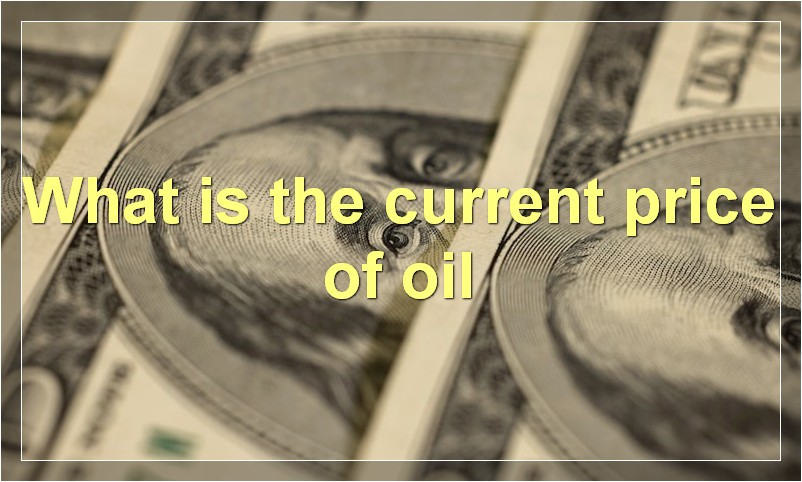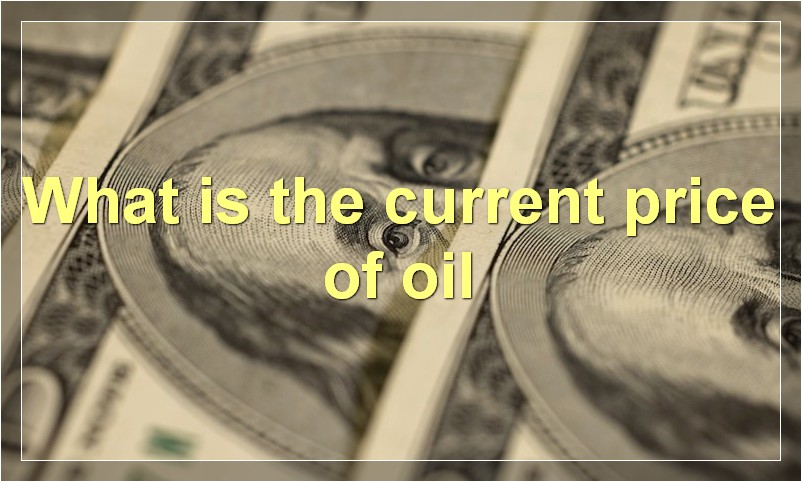With the global economy in a state of flux, oil prices are constantly changing. Here is a look at the current price of crude oil and how it has changed in recent months.
What is the current price of oil

Oil prices are constantly changing due to a variety of factors, including global demand, production levels, and geopolitical instability. However, the current price of oil is around $60 per barrel. This price is relatively low compared to recent years, when oil prices were often above $100 per barrel.
How has oil prices changed in the past year
Oil prices have been volatile in the past year, but overall have trended downward. In early 2014, oil was trading at around $100 per barrel. By the end of the year, it had fallen to around $60. This trend continued into 2015, with oil dipping below $50 per barrel in January. Prices have slowly risen since then, but as of June 2015 are still well below the levels seen a year earlier.
The falling oil prices have been driven by a number of factors. Firstly, global economic growth has been relatively weak in recent years. This has led to lower demand for oil, as businesses and consumers alike have cut back on their use of energy. Secondly, production levels have remained high, meaning that there is an oversupply of oil on the market. This has put downward pressure on prices, as producers compete to sell their product.
The falling oil prices have had a number of impacts on the global economy. For example, countries that are heavily reliant on oil exports have seen their revenues decline sharply. This has led to budget deficits and currency devaluations in some cases. Additionally, the lower prices have made it difficult for drillers and other energy companies to justify new investment projects. As a result, the industry has seen a slowdown in growth in recent months.
Why do oil prices fluctuate
Oil prices fluctuate based on a variety of factors, including global events and production levels. The Organization of the Petroleum Exporting Countries (OPEC) also plays a role in setting oil prices. OPEC is a cartel of oil-producing nations that work together to regulate the world supply of oil. When OPEC cuts production, it can cause prices to rise. geopolitical events can also impact oil prices. For example, if there is unrest in a major oil-producing country, it could lead to higher prices.
How can I live oil prices
As the world becomes increasingly reliant on oil and gas, it is important to understand how changes in prices can affect our lives. Here are some ways that rising oil prices can impact us:
1. Higher fuel costs: As the price of crude oil increases, so does the price of gasoline and other fuels. This can lead to higher transportation costs for individuals and businesses, as well as increased costs for goods and services that are transported using fuel.
2. Inflation: Rising oil prices can lead to inflationary pressures in the economy, as businesses pass on their higher costs to consumers in the form of higher prices.
3. Economic growth: While high oil prices can be a drag on economic activity in the short-term, they can also spur economic growth in the long-term by encouraging investment in new energy technologies and sources.
4. geopolitics: Changes in oil prices can have major implications for global politics and security. For example, high oil prices may put pressure on countries with large import bills, while low prices may benefit exporting countries.
What factors affect oil prices

Oil prices are a key driver of the global economy. They can have a significant impact on the cost of living, inflation, and economic growth. Here are some factors that can affect oil prices:
1) Global oil demand: This is perhaps the most important factor affecting oil prices. Oil is a global commodity, and changes in global demand can have a big impact on prices. For example, if there is an increase in global oil demand, prices will usually rise. On the other hand, if there is a decrease in demand, prices will usually fall.
2) Global oil production: Another important factor affecting oil prices is global production levels. If there is a decrease in production (due to political unrest or natural disasters), prices will usually rise. On the other hand, if there is an increase in production, prices will usually fall.
3) Geopolitical tensions: Tensions in the Middle East can often have a big impact on oil prices. This is because the region is home to some of the world’s largest oil reserves. When tensions rise, there is often a fear that supplies could be disrupted, which can lead to price increases.
4) Weather: Extreme weather conditions can also affect oil prices. For example, if there is a hurricane in the Gulf of Mexico, this can disrupt oil production and lead to higher prices.
5) The US dollar: Oil is priced in US dollars, so changes in the value of the dollar can impact prices. If the dollar strengthens, this makes oil more expensive for buyers using other currencies, and this can lead to lower demand and lower prices. Conversely, if the dollar weakens, this makes oil cheaper for buyers using other currencies, and this can lead to higher demand and higher prices.
Will oil prices continue to rise
As we all know, oil is a finite resource. It is estimated that the world has about 1.7 trillion barrels of crude oil reserves. That sounds like a lot, but it’s actually only enough to last for the next 53 years at the current rate of consumption. So, it’s not surprising that oil prices have been on the rise in recent years, and they are expected to continue to rise in the future.
There are a number of factors that contribute to this trend. First, there is growing demand for oil from developing countries, such as China and India. As these countries continue to industrialize and their populations grow, they will need more and more oil to fuel their economies. At the same time, production levels are not keeping pace with this demand growth. In fact, according to the International Energy Agency, global oil production has flatlined since 2005, even as demand has continued to rise. This imbalance between supply and demand is one of the main reasons why prices have been going up.
Another factor that contributes to higher oil prices is instability in the Middle East, which is one of the major producing regions. Political unrest and conflict in this region can lead to disruptions in the supply of oil, which in turn drives up prices. For example, prices spiked in 2011 when there was unrest in Libya and Egypt.
So, what does this all mean for the future? Well, it’s safe to say that oil prices are not going to come down anytime soon. They are likely to continue to rise in the years ahead, as demand grows and supplies remain tight. This could have major implications for the global economy, so we’ll all be watching closely to see how this plays out.
What is the future of oil prices
The future of oil prices is a hot topic of debate among energy experts. Some believe that oil prices will continue to rise in the coming years, while others believe that they will level off or even decline.
One thing that is certain is that the demand for oil will continue to grow in the coming years. The world’s population is projected to grow by 1.6 billion people by 2030, and this growth will be accompanied by an increase in demand for energy.
Global economic growth is also expected to contribute to higher oil prices. As countries like China and India continue to grow, their demand for oil will increase.
However, there are also factors that could lead to lower oil prices. One is the increasing use of alternative energy sources. As solar, wind, and other renewable energy sources become more affordable and efficient, they will increasingly be used in place of oil.
Another factor that could lead to lower oil prices is the possibility of a recession. If the global economy weakens, demand for oil will decline.
Ultimately, predicting the future of oil prices is difficult. However, it seems likely that they will continue to be a major factor in the global economy for the foreseeable future.
What impact do oil prices have on the economy
The impact of oil prices on the economy is a topic of much debate. Some say that oil prices have a significant impact on the economy, while others claim that the impact is relatively small. However, there is no denying that oil prices can have an effect on different aspects of the economy.
For example, when oil prices increase, it often results in higher gasoline prices. This can cause people to cut back on their driving, which can lead to less consumer spending and a decrease in economic activity. Additionally, higher oil prices can also lead to inflation, as businesses pass on their increased costs to consumers in the form of higher prices.
On the other hand, some economists argue that the impact of oil prices on the economy is overstated. They point out that the United States is now a much more energy-efficient country than it was in the past, so higher oil prices don’t have as big of an impact as they once did. Additionally, they argue that the benefits of lower oil prices, such as increased consumer spending, outweigh the negatives.
At the end of the day, it’s impossible to say definitively whether or not oil prices have a significant impact on the economy. However, there is no doubt that they can have an effect, and it’s something that policymakers and economists will continue to debate in the years to come.
What are some ways to invest in oil
Oil is a natural resource that has been used for centuries to fuel our homes and businesses. Today, oil is still an important part of our economy and there are many ways to invest in it.
You can invest in oil companies through the stock market, or you can invest directly in oil projects. There are also many different types of oil investments, from traditional oil wells to more speculative ventures like oil sands and shale gas.
No matter what type of oil investment you choose, you will need to do your research and understand the risks involved. Oil prices are volatile and can rise and fall quickly. But if you are patient and smart about your investments, oil can be a great way to secure your financial future.

